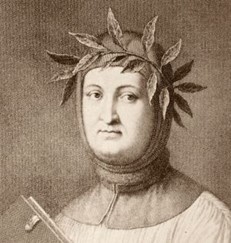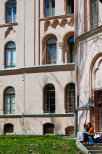Call for papers ENG

"Sentioque inexpletum quiddam in precordiis meis semper"
(Secretum)

The Department of Italian Language and Literature of the University of Szeged
in cooperation with
the Italian Cultural Institute of Budapest and the Tiszatáj Foundation
invites you to the
THE 650TH ANNIVERSARY OF THE DEATH OF FRANCESCO PETRARCH
"LA SFIDA ALLA PAROLA"
INTERNATIONAL SCIENTIFIC CONFERENCE
7-8-9 November 2024
Szeged
Six hundred and fifty years ago, on 19 July 1374, in the town of Arquà, in the Euganean Hills, Francesco Petrarch, then 70 years old, suddenly fell asleep while reading and writing. There is no element of his incredibly rich intellectual legacy that does not provide new reasons or themes for constant commemoration. He is remembered as the father of modern lyricism, the prototype of the cosmopolitan intellectual, a genius at the crossroads of the Middle Ages and the Renaissance, who combined in his work the artistic, intellectual, philosophical and moral responses to the challenges of both periods.
But can the prophet of humanism still have any relevance in an age that has succumbed to the cult of knowledge for its immediate practical utility and the cult of the narcissistic mass society, which sees the word as a mere manipulative tool? European culture seems to have bowed its head to the legacy of Descartes and, in the spirit of critical thinking, first declared war on the humanistic sciences and then, drunk on the exhilaration of victory, soothed its conscience by tolerating as a field of learning those sciences that can be translated into the language of mathematics, rationally accessible and systematised. The four-century-long agony of the studia humanitatis here and there is coming to an end, and it seems to be forced to bow its head before the current epochal transformation of our times. Yet the reality of AI, the language-absorbing mass media and the humanity’s civilising mission to colonise alien planets and galaxies, cry out for man's own unique intellectual 'faculties' and capacities, which cannot be captured by criticism or mathematics, nor can they be replaced by even the most perfect humanoid robot. This epistemological insight can lead us back to a conscious embrace of the importance of the human word, of language and of all the disciplines capable of saving man in an increasingly dehumanised world.
As part of the series of conferences, academic symposia and cultural events organised to mark the 650th anniversary of Petrarch’s birth, we are launching this call to address Petrarch, whose poetry and works in Latin and in the vernacular reveal a man who trusted in the epistemological power of words, whether he was a humanist scholar or a man who relieved Laura, a celebrated poet of the noble courts or a lonely soul struggling with his sins. The intellectual legacy of his life's work should be preserved not for its sheer richness, but for its essential quality of being a mirror of the human soul and spirit. We need Petrarch as much we need a renewed humanism.
The aim of this call is to honour the memory of Francesco Petrarch 650 years after his death: to draw the attention of the academic community to his poetic and philosophical works in Latin and in the vernacular, to their reception in the various national literatures, and to the issues raised by their translation into modern languages. The conference, organised in cooperation with the Italian Department of the University of Szeged, the Italian Cultural Institute of Budapest and the Tiszatáj Foundation, aims to reconstruct Petrarch's intellectual journey by examining the great poet and philosopher's works in a European context, taking into account the different cultural and linguistic contexts in which the reception of his works has unfolded over the centuries.
With this in mind, our conference invites applications along one of the following (non-exclusive) lines of research:
- Recent achievements and challenges in Petrarchan philology
- Petrarch and the Classics
- Petrarch and the Middle Ages
- Petrarch, the "Father of Humanism"
- Petrarch in historical context
- Petrarch's poetry
- Petrarch as a (moral) philosopher
- Petrarch and religion
- The impact of Petrarch's poetry on the history of European literature (Petrarchism in the Italian and European context up to the 2000s)
- Petrarch in European languages and cultures, with special reference to the reception of Petrarch in different countries
- Questions concerning the translation of Petrarch's poetic and philosophical works
- Petrarch in the light of modern theories of literature
- A life told: wandering in the world of biography and text
- Geographical and topographical places in Petrarch's works
- Petrarch between images and words: iconographic research
The conference is open to submissions for Poster and Scientific Lecture sections.
We also welcome your interest and suggestions for the following Round Table discussions:
– Project for a comprehensive study of the European reception of Petrarch's works
– Project on the history of Petrarch's reception in Hungary
– Project for an annotated Hungarian edition of Petrarch's works (in Latin and the vernacular)
The aim of the conference is to create a dialogue between Petrarch scholars from different countries, in order to promote research within the discipline and to provide an opportunity for collaboration. It is also particularly important to provide a space for young researchers, doctoral students and doctoral candidates from different countries who are open to dialogue. Therefore, we invite researchers involved in PhD training to encourage their doctoral students to participate either as speakers or as audience members.
Participation is free of charge for young researchers (under than 36 years of age) and doctoral students.
Conference language: Italian
Conference presentations: 25 minutes (plenary presentations 50 minutes)
Plenary presentations:
Luca Marcozzi – Università degli Studi Roma Tre
Jean-Luc Nardone – Université Toulouse – Jean Jaurès
Ádám Nádasdy – Eötvös Loránd University
Natascia Tonelli – Università degli Studi di Siena
Invited institutions:
The journals Petrarchesca and Studi petrarcheschi
Petrarca Online project
Key deadlines:
Submit your application: 08 September 2024
Feedback: 22 September 2024
How to apply:
Please complete the attached Application Form and send it to the following email address:
petrarca650.univ.szeged@gmail.com
Registration fee:
The registration fee is €50 and includes the printing costs of the abstract booklet, refreshments and snacks during the conference breaks. Conference dinners are optional. Participants are responsible for their own travel and accommodation costs.
Presentations given at the conference will be published in the conference proceedings.
Participation is free for young researchers (under 36 years of age) and PhD students.
Payment:
Applicants will be notified by letter of acceptance of their abstract and the account number and deadline for payment of the above registration fee.
Scientific Committee:
Rossend Arques Corominas – Universitat Autònoma de Barcelona
Guido Cappelli – University of Naples "L'Orientale"
Irene Chirico – University of Salerno
Kinga Dávid – University of Szeged
Eszter Draskóczy – Research Centre for the Humanities Institute for Literary Studies
Péter Ertl – Eötvös Loránd University
György Dávid Falvay – Eötvös Loránd University
Monica Fekete – Babeş-Bolyai University
Giuseppe Frasso – Università Cattolica del Sacro Cuore
István Dávid Lázár – University of Szeged
Réka Lengyel – Research Centre for the Humanities Institute for Literary Studies
Luca Marcozzi – Roma Tre University
Norbert András Mátyus – Pázmány Péter Catholic University
Jean-Luc Nardone – Université Toulouse – Jean Jaurès
Ádám Nádasdy – Eötvös Loránd University
Armando Nuzzo – Pázmány Péter Catholic University
Giulia Perucchi – D'Annunzio University of Chieti-Pescara
Jiří Špička – Palacký University Olomouc
Sabrina Stroppa – University for Foreigners of Perugia
László Szörényi – University of Szeged
Natascia Tonelli – University of Siena
Andrea Torre – Scuola Normale Superiore
Éva Vígh – University of Szeged
Organising Committee:
Main organisers:
Dávid Kinga - University of Szeged
Éva Vígh - University of Szeged
Organisers:
Boglárka Bakai - University of Szeged
Péter Ertl - Eötvös Loránd University
Farkas Mónika Kitti - University of Szeged
Gergely Kadvány - University of Szeged
István Dávid Lázár - University of Szeged
Lorenzo Marmiroli - University of Szeged
Eszter Sermann - University of Szeged
Andrea Zentainé Kollár - University of Szeged
For the latest news, participants, programme and other information about the conference, please visit the constantly updated website:
https://arts.u-szeged.hu/ita-petrarca650
We look forward to welcoming you in Szeged!




